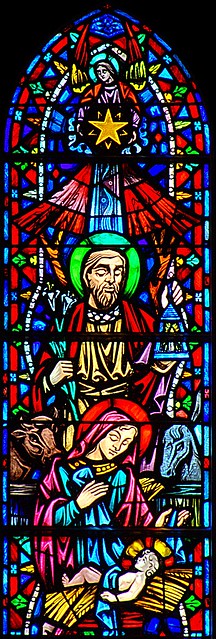 |
| Christmas is the celebration of God’s gift of a savior to redeem us all from our sins |
I suppose there are many ways to answer this, but the truth is that yes, Christmas can be offensive to some, but the reality of Christmas celebrates the least offensive event in all of history.
First, there are people who misuse the name of Jesus only as a vulgar exclamation. If they see the name of Jesus as vulgar, then they would certainly see His birth as offensive. However, those who only use Christ’s name as a curse word are misusing it, and any offense they give or receive at the name of Jesus is their own fault, and not something that Jesus Himself is responsible for.
Likewise, there are people who would never use Jesus’ name as a vulgar exclamation, or as a curse, and in fact see themselves as good people, and who still might be offended by Christmas. Jesus is God who became incarnate as a person because that was the only way He could redeem us from our sins. Those “good” people who don’t admit to being sinners are offended that the birth of Jesus shows that they aren’t nearly as good as they think they are. They think they don’t need a savior, much less do they think that God Himself had to die to save them from their sins. They think that if God had to die for sinners, it must have been for “other people” who are worse than them. The birth of Jesus offends them because it puts them in the same category as people they despise nearly as much as Jesus.
The temptation to idolatry is the most common temptation that we face. We usually think of idol worship as bowing down to a man-made statue or some kind of false god. However, the most common form of idolatry is to think of one’s self as god. This, in effect, was the temptation which seduced Adam and Eve when they were still in the Garden of Eden. If this temptation corrupted Adam and Eve when they were still innocent, we, who are already corrupted by sin, are much more likely to fall for this temptation and see ourselves as our own god. Wherever this is true, we see the true God as a rival and we take offense at Him in His person, and in His word and works.
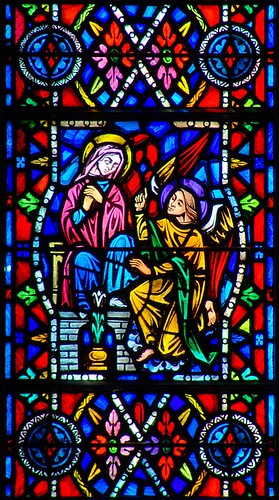 |
| Mary heard the word of God and she believed. |
After three months, when Mary went back to Nazareth and told Joseph the news, he did not rejoice. He was rather offended. He had been faithful and chaste and knew that he had not fathered any child, so when Mary shows up pregnant, he assumed that she had been unfaithful. This was a logical (though wrong) assumption. Ever since the creation of Adam and Eve, all people have been conceived the same way. No virgin, before or since, had ever become a mother. Matthew 1:19 tells us that Joseph had made up his mind to divorce Mary quietly, so as not to put her to shame, but I am sure that in their conversations that day there was more than a few tears shed by both Mary and Joseph. Such was the supposed offense.
That evening and angel of the Lord appeared to Joseph in a dream and told him, “Joseph, son of David, do not fear to take Mary as your wife, for that which is conceived in her is from the Holy Spirit.” To Joseph’s credit he believed the word of God from the angel, even though it was essentially the same thing that Mary had told him earlier which he did not believe. The offense that he had presumed from Mary was so great that he couldn’t bring himself to believe her, at first, because she had every reason to lie if she was, in fact, unfaithful. Yet, when Joseph heard God’s word from the angel, he repented of his disbelief and kept Mary as his wife and continued to refrain from intimate relations with her until an appropriate time after Jesus was born.
The actual birth of Jesus was also most inoffensive. Joseph and Mary had to travel South to Bethlehem to comply with a decree from Caesar Augustus about registering in a census. Even though the Davidic dynasty of kings had ended several hundred years before the days of Joseph and Mary, there were likely many, many Jews of that day who could trace their ancestry back to King David. Remember that David’s youngest son and heir, Solomon, alone had 300 wives and 700 concubines, and surely also fathered more than his fair share of children, though the Scriptures don’t tell us how many children came from these arrangements. Even acknowledging that over the years some of David’s descendants may have lost track of their ancestral line, there surely was quite a crowd that was coming to Bethlehem to register for Caesar’s census. Yet, the birth of the Son of God didn’t put anyone out the night He was born. Instead, Mary and Joseph apparently stayed in a barn (or its equivalent), and placed the newborn baby Jesus in a manger as his first crib. This humble birth was the very opposite of offensive.
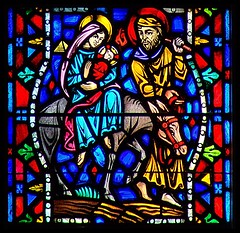 |
| Joseph protected his family by taking them to Egypt until the death of Herod |
The murderous insanity of Herod shows the tragic foolishness of taking offense at the birth of Jesus. Yet it also reminds us that we shouldn’t be surprised when people take offense at this wonderful event.
The birth of Christ is such an important event in human history that when the Roman empire became a Christian empire after Constantine legalized Christianity, they eventually made an effort to count the years from the birth of Jesus. They likely weren’t perfect in this, and we now believe Jesus was born around 3-4 B.C. as we count the years. The description of the years as B.C. (before Christ) and A.D. (Anno Domini – year of our Lord) also offends people who don’t recognize Christ as Lord and they would rather describe the years as B.C.E. (before the Christian era, or before the “common” era) and C.E.
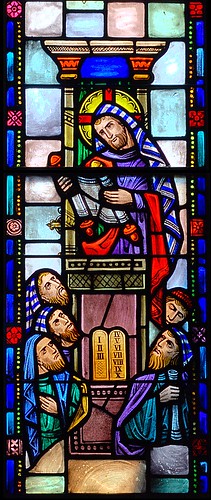 |
| Jesus was rejected in Nazareth |
John 5 tells of a time when Jesus healed a crippled man on a Sabbath day, and the Pharisees took offense at this. They ought to have rejoiced that Jesus had mercy on this poor man who had been crippled for 38 years. Instead, they were offended that Jesus broke their man-made laws about Sabbath work. They were also offended that such a great miracle would draw the people’s respect and admiration to Him instead of them. Jesus was not breaking God’s laws about the Sabbath because as He told those who were offended, “My Father is working until now, and I am working.” They also took offense at this because He was calling God His Father, and showing Himself equal with God. Though they ought to have recognized the evidence that Jesus is God, they instead sought to kill Him.
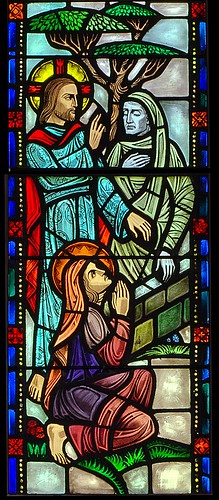 |
| The idolatrous Jewish priests took offense at Jesus raising Lazarus from the dead. |
The bottom line of Christmas is that “Christ Jesus came into the world to save sinners.” (1 Timothy 1:15) Sinners who resent being reminded of the truth are offended by this. On the other hand, sinners who recognize their desperate situation and see the hope and comfort in God coming to save us from our sin rejoice in the birth of Jesus along with His life and death and resurrection from the dead.
This past year (2017) was one of the most painful years that I have ever experienced. You know it is bad when a broken leg (and subsequent recovery and rehabilitation) was not the worst thing that happened. Yet, the blessings of Christ and His forgiveness and salvation were a comfort to me in sickness and in health, in pain and in pleasure, in sorrow and in joy.
May the forgiveness and salvation that Jesus won for you give you joy and peace and all blessings this Christmas season. May you never take offense at Christ or any of God’s work to redeem you and make you His beloved child. Merry Christmas.



